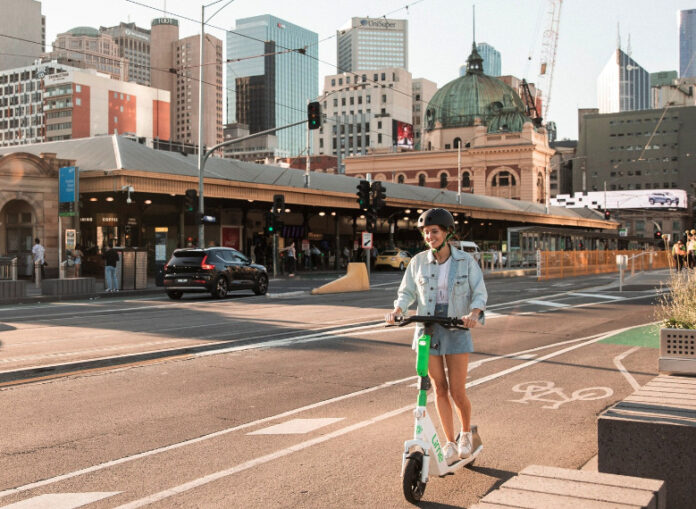City of Melbourne Council is trialling new technology to prevent e-scooter riders from using footpaths and cluttering city spaces.
A fleet of 25 Lime e-scooters equipped with advanced camera capabilities has been rolled out across the city as part of the State Government’s shared e-scooter trial.
The scooters use real-time footpath detection and audio alerts to crackdown on illegal footpath and tandem riding.
“Melburnians have scooted their way past five million rides since the beginning of the e-scooter trial last year – cementing the city as a global hotspot for e-scooters and creating more ways to access thousands of businesses and activities across Melbourne,” said Acting Lord Mayor, Nicholas Reece.
“We also recognise that there has been frustration felt by members of the community about people breaking the rules and causing nuisance around the city. We have listened and we have acted.”
“We have worked with the providers, Lime and Neuron Mobility, who are rolling out new technology advancements that will deliver safer and more accessible city for all Melburnians.”
Trial providers, Lime and Neuron Mobility, are also exploring technology to create designated e-scooter parking areas.
A pilot using in-app communication to direct riders to designated parking zones is underway on Swanston and Elizabeth Streets and in Jolimont – which has already reduced complaints by 55%, the A/Lord. Mayor said.
Council is also investigating on-street parking stations and physical line markings on footpaths to create clearly marked zones to hire and return e-scooters.
“We are also working closely with Victoria Police to ensure the small minority of people doing the wrong thing are held accountable.”
“These improvements will help us fill the gaps in our comprehensive transport network – boosting the local economy by attracting more visitors with a fun way to get around the city swiftly and safely.”
“With the help of e-scooters, we’re delivering a brighter, more sustainable future for Melbourne – keeping the city moving while dialling back transport emissions.”
Other technology in development includes:
- Artificial intelligence systems – preventing riders from ending a trip without parking correctly
- Alcohol detection and deterrence systems – combatting intoxicated riding
- Rider identification verification systems – targeting underage riding
- Dual band GPS and Bluetooth technology – improving the accuracy of locating e-scooters, geofencing and designated parking
- On-board mapping – reducing reliance on GPS positioning
At next week’s Future Melbourne Committee meeting, councillors will consider a range of measures to ensure the delivery of a safe, effective and well-integrated shared e-scooter scheme into the future.
If endorsed, Council will advocate to the State Government to ensure higher standards of parking and rider behaviour can be delivered; and for the legal power to manage an e-scooter scheme via an agreement with operators.
“We’re making e-scooter use as safe, viable and accessible as possible, so Melburnians can continue to get where they need to go,” said City Transport, Infrastructure and Operations deputy portfolio lead, Councillor Davydd Griffiths.
“We hope to see the new technology reduce footpath and tandem riding, and we look forward to working with our partners to find new and improved ways of managing e-scooter parking to keep our footpaths safe for pedestrians.”
Council has also begun discussions with other inner-Melbourne municipalities in preparation for the possible expansion of the shared e-scooter scheme.


